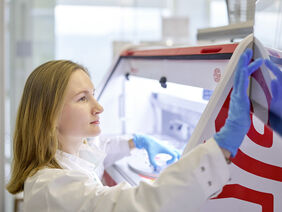“So many labs, so much high-tech equipment, so many possibilities!” Anastasiia Shcherbakova can hardly put her enthusiasm into words. Since September of last year, the 24-year-old PhD student has been part of the Leibniz Institute on Aging – Fritz Lipmann Institute (FLI). In the Research Group “Microbiome and Metabolism in Aging”, led by Clara Correia-Melo, she investigates the metabolic communication between cells, which involves the exchange of signaling molecules, metabolites, or other biochemical substances among cells. This exchange allows cells to coordinate their metabolic activities and respond to changes in the environment. They share information about their energy status, nutrient availability, and environmental conditions, for example. The particular focus of Clara Correia-Melo's Research Group is on the influence this communication has on healthy vs disease-asociated aging, but also how cells respond to therapeutic drugs.
Anastasiia, the native Russian, discovered the FLI in Jena through the internet. “I did a lot of research and came across the FLI. After initial interviews with the research group leader, I was truly fascinated, and I was sure: I have to go there.” The journey from the Volga to Jena was not easy. “But now I have arrived, and day by day, I develop a deeper understanding of aging research.”
What she means is that research is hard work. Small successes often take a long time to materialize. “But I feel tremendous freedom in my work and am continually developing personally,” says Anastasiia. The constant exchange with colleagues from various nations, diverse training opportunities, and, not least, the high-tech equipment in the labs contribute to this. In particular, the high-throughput robotic systems has captured her interest, and soon Anastasiia will have more of it: The research group's laboratory is undergoing relocation and technical expansions. The team expects, among other things, to have a high-throughput mammalian and microbiome culture & phenotyping platforms to dissect the intricate host-microbiome chemical interactions. Expectations are high because the team soon will finish setting these platforms and also receive a mass-spectrometer to evaluate metabolomes, which together with all other technological platforms FLI offers, will elevate the possibilities for studying microorganisms and cells to an even higher level.














